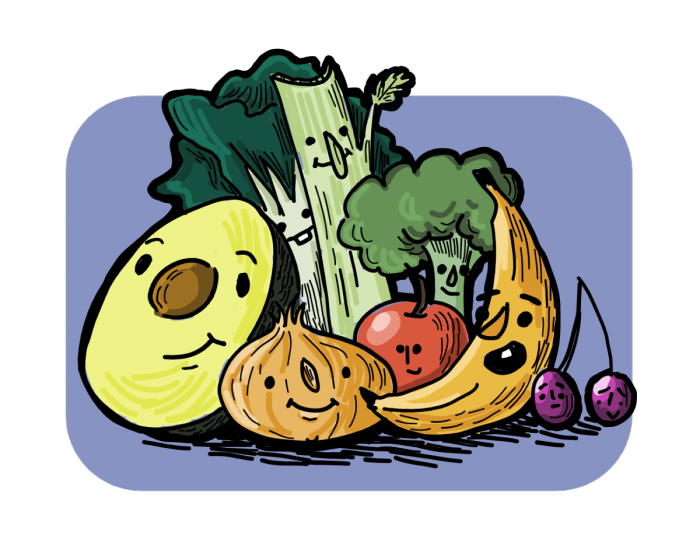Plant-based eaters come in many forms. Traditional vegetarians, also known as lacto-ovo vegetarians, do not eat animal flesh of any kind but will consume dairy and eggs. Pesco-vegetarians, or pescatarians, incorporate fish into their otherwise vegetarian diet. Vegans are those who abstain from all animal-derived products, including dairy, eggs, and honey. In addition to these lifestyles, there is a spectrum of plant-based diets with a variety of different dietary limitations and restrictions.
But why go vegetarian? People choose to adopt plant-based diets for multiple reasons. Some experts have estimated that vegetarians can save around 750 dollars a year at the grocery store by going meatless, but others choose the diet as a method of combatting climate change, or reducing animal suffering. Whatever reason one might choose for becoming a vegetarian, these diets provide a variety of health benefits, so long as certain precautions are taken to avoid nutritional deficits.
Anne-Sophie Brazeau, an assistant professor of Human Nutrition at McGill, wrote about the myriad of health benefits that can come from adopting a vegetarian diet in an email to The McGill Tribune.
“[A vegetarian diet] has been associated with lower rates of obesity, heart disease, high blood pressure, high cholesterol, type 2 diabetes and certain types of cancer,” Brazeau wrote. “For example, large prospective studies showed that, on average, vegetarians are 20 to 25 per cent less likely to die of heart disease.”
A reduction in the amount of saturated fat and cholesterol consumed, and an increase in the amount of dietary fibre, may explain the numerous benefits of a vegetarian diet. Along with artery-clogging saturated fats, meat can also contain carcinogenic compounds and artificial hormones. A diet and health study from the National Cancer Institute showed that participants who ate the most red meat experienced a 26 per cent increase in their risk of death from various causes. Another danger is the spike in antibiotic resistance, which has increased due to the large quantities of antibiotics animals are treated with.
Despite the diet’s potential health benefits when properly executed, vegetarians whose diets consist of cheese, pizza, and Coke cannot expect to be any healthier than the average meat eater. In fact, a vegetarian diet requires a great deal of planning. Brazeau stressed the importance of planning meals to increase one’s daily intake of grains, vegetables, fruits, and legumes in these types of diets, and warned about the potential detriments of a plant-based diet if it is not properly planned out.
“Vegetarians are at risk of vitamin and mineral deficiencies, and individuals may be at risk of developing anemia and osteoporosis,” Brazeau wrote. “By excluding meat, poultry, fish, eggs, and/or dairy products, extra care should be taken to make sure to cover their needs of protein, iron, vitamin B12, calcium, vitamins, and omega-3 fatty acids as those nutrients are more abundant in animal products.”
Vegan diets require an even greater deal of planning to make sure that they provide healthy nutrient uptake. Oftentimes, supplements may even be needed to achieve nutrient quotas.
Protein is necessary for the body to build and repair tissues, such as bones, muscles, and cartilage. Vegetarians can easily get the protein they need from egg and dairy products. For vegans, sources of plant protein include peas, beans, lentils, chickpeas, seeds, nuts, whole grains, and soy products. Eating soy products provides the extra benefit of omega-3 fatty acids, which play a crucial role in brain function and the reduction of heart disease. Omega-3s can also come from flaxseeds, walnuts, and canola oil. Iron is important for red blood cells to carry oxygen around the body, and a deficiency of iron can cause anemia.
According to Brazeau, vegetarians need to consume about twice the amount of iron that non-vegetarians do, because iron from plant foods is not absorbed as well as iron from animal foods. Plant-based iron sources include cocoa powder, molasses, legumes, and leafy greens. Leafy greens are also a good source of calcium, a mineral that builds strong bones and can prevent osteoporosis, especially essential to women who are more prone to the disease.
Ultimately, while adopting a vegetarian diet can be a healthy option, a well-balanced one is key to receiving all the health benefits that it can bring.










“Vegetarians are at risk of vitamin and
mineral deficiencies, and individuals may be at risk of developing
anemia and osteoporosis”. Based on that sentence alone, I’m not sure how you would come to the conclusion that a vegetarian diet is healthier. That should be a giant red flag that it’s not a natural diet that could have sustained humans before supplements were invented. In fact, humans are ominvores for a reason and that reason is that we are dependent on nutrients from animals (like B vitamins). Synthetic vitamins and minerals are generally not a good substitute because the formulations either do no good at all because they aren’t absorbed well or they are downright harmful (the oxidized version of folic acid which is found in nearly all supplements is a good example of this). If we simply ate the foods that our great-grandparents ate, I suspect we would all be MUCH healthier.